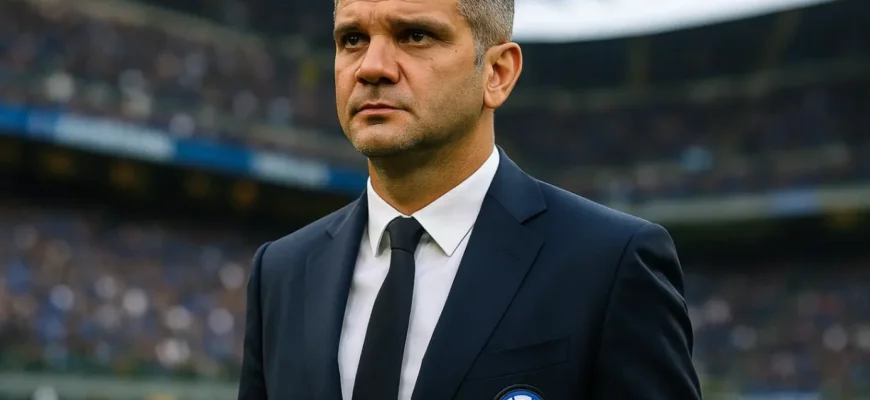In the demanding theater of Italian football, change is a constant, yet its implementation is rarely seamless. At Inter Milan, a new chapter has begun under coach Cristian Chivu, a man whose playing career was defined by resilience, even after a severe head injury. Now, with the tactical ghost of Simone Inzaghi’s successful, yet sometimes predictable, era still lingering, Chivu faces the daunting task of sculpting a new identity for the Nerazzurri. The question isn`t just “what`s changed?” but “what *needs* to change, and how quickly?”
The Architect`s Vision: Verticality Over Varnish
Chivu`s directive is clear: a more vertical, less elaborate style of play. For years, Inter`s 3-5-2 formation, under Inzaghi, became synonymous with controlled possession and intricate build-up. While often effective, this approach sometimes veered into sterile territory, resembling a beautifully constructed, yet ultimately harmless, tapestry. Chivu, drawing from his own history of facing adversity head-on—literally, given his past injury—believes in a more direct assault on the opposition`s goal. He wants the ball to travel faster, on new trajectories, leveraging the team`s rich midfield options.
This isn`t a mere cosmetic tweak; it`s a “genetic transformation,” as some have dubbed it. The club, wisely, stands firmly behind him, acknowledging that habits forged over four years are not easily unlearned. Patience, they preach, is a virtue. However, football is a sport that often punishes patience, especially when a looming clash with arch-rivals Juventus threatens to widen the points gap. The recent stumble against Udinese, a home defeat in only the second match, has undoubtedly accelerated the metaphorical clock for the new coach.
No Radical Overhaul, Just a Shift in Aggression
Despite the early setback, Chivu is not advocating for a radical revolution. Disavowing his strategy after a single misstep would be a self-inflicted wound, an own goal in the coaching playbook. Instead, he demands a shift in attitude from his seasoned campaigners. The “old lions,” wounded but still central to his plans, are being asked to embody a newfound ferocity and verticality within the familiar 3-5-2 system. This means that players deeply ingrained in Inzaghi`s philosophy must now adapt, becoming more aggressive and direct in their play, both offensively and defensively.
Hakan Calhanoglu, for instance, remains the undisputed regista, the orchestrator of Inter`s midfield. Yet, after a challenging summer and a noticeable lack of match fitness in the Udinese game, he must now couple his technical prowess with a more aggressive approach to covering spaces and initiating rapid attacks. Chivu sees in Calhanoglu the ideal pivot for this new, quicker philosophy, provided he and his midfield colleagues can display a “whole different ferocity” when plugging defensive gaps.
Midfield Dynamics: Frattesi`s Endless Search and New Blood
The quest for “concreteness” is driving Chivu`s midfield decisions. The bane of this new era, he identifies, is a certain “ancient fanciness”—an excessive, sterile possession that leads nowhere. The solution lies in making the ball move with greater intent. Inter`s array of `mezzalas` (box-to-box midfielders) are now tasked with this critical mission.
New arrivals like Luka Sucic and the promising French left-footer Diouf, acquired for a not-insignificant 25 million euros, are pushing for starting spots, ready to inject fresh dynamism alongside established figures like Nicolò Barella. On the other hand, veterans like Henrikh Mkhitaryan and Piotr Zielinski (now fully fit) may find their stock slightly diminished. While they still offer valuable “wisdom” in key moments, their roles might increasingly be rotational.
Perhaps the most intriguing subplot revolves around Davide Frattesi. Chivu reportedly “adores” Frattesi as a specialized attacker playing close to the forwards. However, the current tactical imperative to field three traditional central midfielders, coupled with the market not providing a solitary defensive anchor (a “centurion” like a Koné, as the article ironically suggests), means Frattesi might once again find himself battling for a consistent mezzala role, rather than playing further forward. This familiar predicament, which previously led to Frattesi`s “stomach aches” (discontent), is another challenge Chivu must solve as he steers Inter from Inzaghi`s “creature” towards his own vision. As they say, when in doubt, Chivu will once again look “under the old helmet” for the solution, just as “dad Mou” taught him: never take a step back, always two steps forward.







